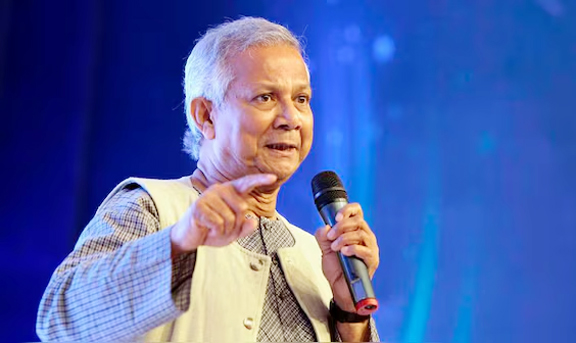DE News Desk :
Chief Adviser of the interim government, Professor Muhammad Yunus, has expressed serious frustration over the ongoing political turmoil and has indicated that he may step down if the situation fails to stabilize, multiple sources close to the cabinet confirmed on Thursday.
During a cabinet meeting held in the morning, Yunus voiced his concerns about the continued political gridlock, street protests, and partisan clashes.
Sources said the meeting, which lasted about an hour, was followed by an extended closed-door discussion in his office lasting over three hours.
During this time, Yunus reportedly informed his advisers that he had prepared a letter of resignation and was contemplating its submission.
“All government officials were asked to leave the room when Yunus began his conversation with cabinet colleagues,” a source familiar with the matter said.
Housing and Public Works Adviser Adilur Rahman Khan reportedly supported Yunus’s stance, saying he too was ready to resign, describing the political climate as “insulting” to the cabinet.
Several other advisers echoed his sentiment, according to the same source.
However, Information Adviser Mahfuj Alam urged Yunus to reconsider, cautioning that a sudden resignation could plunge the nation into deeper political uncertainty.
“If you resign now, the country could face serious consequences,” Alam reportedly told the chief adviser.
The political situation has intensified in recent days, with the Bangladesh Nationalist Party (BNP) staging demonstrations across Dhaka, particularly around Kakrail Road near the official residence of the chief adviser, demanding the swearing-in of Ishraque Hossain as mayor of Dhaka South City and the removal of three advisers.
The unrest coincides with comments made a day earlier by Army Chief General Waker-Uz-Zaman during an address at Dhaka Cantonment, where he emphasized the urgency of holding general elections by December and criticized the government’s plan to open a humanitarian corridor to Myanmar’s Arakan region, citing national interest concerns.
Professor Yunus assumed office as chief adviser on August 8 last year, following the departure of Prime Minister Sheikh Hasina amid a widespread public uprising.
His tenure has been marked by sweeping reforms and mounting pressure from various political parties for a swift return to electoral democracy.
While the BNP and its allies have demanded immediate elections, other parties, including Jamaat-e-Islami and the National Citizens Party (NCP), have called for completing reforms before heading to the polls.
Yunus had previously announced that elections would be held by June of the following year, but the BNP continues to push for a detailed electoral roadmap.
On Thursday, as BNP supporters blocked roads near Jamuna, Yunus’s residence, the High Court cleared the way for Ishraque Hossain’s oath.
Subsequently, BNP leaders Tarique Rahman in London and Mirza Fakhrul Islam Alamgir in Singapore instructed protesters to disperse, leading to the postponement of the party’s programme later in the day.
Meanwhile, NCP convener Nahid Islam met Yunus at 7:00 pm to discuss the unfolding crisis.
According to a senior NCP leader, Yunus reiterated his desire to step down, stating, “I do not want to remain in power if the necessary political environment does not exist.”
Nahid urged Yunus to reflect on the spirit of the July uprising and the public trust placed in him, emphasizing the importance of preserving national unity during this critical juncture.
Later that evening, Jamaat-e-Islami chief Shafiqur Rahman also met with the chief adviser, urging him to convene an all-party dialogue to address the escalating crisis, party insiders confirmed following an emergency meeting of the party’s central executive council in Dhaka’s Moghbazar.
As political uncertainty deepens, all eyes remain on Professor Yunus and whether he will follow through with his resignation—or choose to guide the nation through its fragile transition.

